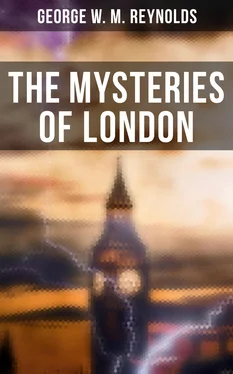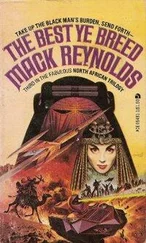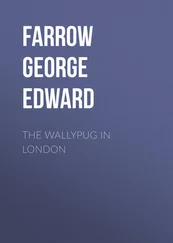"It does not do for me to hold forth in this manner; I know that : but I cannot help expressing the thoughts that occupied me when I was in Newgate. They are often present in my memory; and, sometimes, when I am dull and in low spirits, I console myself by the conviction that if I am bad now, it is because there is no door open for me to be good. So a truce to these ideas. They do not often come from my lips; and even now I scarcely wish to recall them.
"Well—I passed my two years in Newgate; and when I was released, I stood still by the lamp-post at the top of the Old Bailey, thinking which way I should go. I had not a penny in my pocket; and I knew that in the course of a few hours I should be hungry. As true as I am sitting here, tears rolled down my cheeks as I contemplated the necessity of returning to my old pursuits—yes—burning tears—tears of agony—such tears as I never shed before, and shall never shed again!
"Suddenly a thought struck me. I would go to the workhouse. The idea consoled me; and, fearful lest my good intentions should grow cool, I turned back past the door of Newgate again, and directed my steps down the Old Bailey towards Blackfriars' Bridge. In the course of an hour, I knocked at the door of the—— Workhouse, with an order for admission from the overseer.
"It was about twelve o'clock in the day when I entered the Workhouse. The porter conducted me into the office, where the master took down my name, age, &c. He then sent me to the bath-room, where I was cleansed. When I came from the bath I put on the coarse linen, grey suit, and thick shoes which constitute the workhouse garb—the livery of poverty. The dress differed but little from the one I had worn in Newgate—so small is the distinction in this blessed country between a felon and a pauper! My old clothes were put up together in a bundle, labelled with my name, and conveyed to the store-room, to be returned to me when I chose to leave the place. As soon as I was dressed, I was allotted to the able-bodied men's department of the Workhouse. The scale of food for this class of persons was just this:—
|
Bread. |
Gruel. |
Meat. |
Bacon. |
Potatoes. |
Soup. |
Cheese. |
Suet Pudding. |
|
Oz. |
Pints. |
Oz. |
Oz. |
Oz. |
Pints. |
Oz. |
|
| Monday |
14 |
1½ |
.. |
.. |
.. |
1½ |
2 |
.. |
| Tuesday |
21 |
1½ |
.. |
.. |
.. |
.. |
4 |
.. |
| Wednesday |
14 |
1½ |
.. |
.. |
.. |
1½ |
2 |
.. |
| Thursday |
14 |
1½ |
.. |
4 |
8 |
.. |
2 |
.. |
| Friday |
14 |
1½ |
.. |
.. |
.. |
.. |
2 |
14 |
| Saturday |
14 |
1½ |
.. |
.. |
.. |
1½ |
2 |
.. |
| Sunday |
14 |
1½ |
5 |
.. |
8 |
1½ |
.. |
.. |
| Total Weekly Allowance |
105 |
10½ |
5 |
4 |
16 |
6 |
14 |
14 |
"So you see that we had only five ounces of cooked meat and five ounces of bacon, in the shape of animal food, in the course of each week! And yet we had to work—to keep the grounds in order, to do various jobs in the establishment, and to pick four pounds of oakum each, every day, the Sabbath excepted. Felons are better off;[79] for in the prison one has more meat, more bread, and more gruel (which is certainly nourishing) than in the workhouse!
"We had nothing to drink with our dinners and suppers but water—and of that they could not very well stint us, because it cost nothing. The able-bodied women had much less than the able-bodied men. The infirm paupers had each one ounce of tea and seven ounces of sugar weekly, instead of gruel, for breakfast! Fancy one ounce of tea for seven meals!
"We were divided into messes, or tables of ten each; and each mess elected a carver. The duty of the carver was to go to the kitchen and fetch the provision allotted to the individuals at his particular table, and then to distribute it in equal proportions. What fighting and wrangling always took place at meal times! On meat days, one had too much fat, and another's morsel was too under-done:—on bacon days, one had too much lean, and another had the rind given to him. Then one declared that he had been cheated out of a potatoe; and so on. It was a scene of perpetual selfishness—of human beings quarrelling for a crumb! But who can wonder? A potatoe or a cubic inch of bread was a considerable portion of a meal; and where all were ravenous, who could afford to lose even a potatoe or a crumb?[80]
"Neither of you have ever been in a workhouse, I know; and therefore you cannot imagine the change it produces in its inmates. They grow discontented with the world, and look upon their superiors with abhorrence. An army of able-bodied men, recruited from all the Unions in the kingdom, would make the finest republican soldiers imaginable. They would proceed with a good heart to level throne, aristocracy, and every institution which they believed oppressive to the industrious classes.
"But that is no business of mine—and I care nothing for politics of any kind. Of an evening, we used to gather round the fire till bed-time, and talk of our past lives. Many—many of my companions, had, like myself, seen better days; and it actually made one's heart ache to hear them compare their former positions with their present ones. And after all, what can be more inhuman—what more cruel, than the very principles of the workhouse system? Old couples, who have lived together for years and years, are separated when they go to the workhouse. Mothers are debarred from the society of their little ones:—no ties of kindred are respected there !
"I remember one man—he was about sixty, and much better behaved than the rest—who had been a writer, or something of that kind, in his time. The men used to get him now and then, when he was in the humour to recite poems—some of which he had composed in better days, and others since he had been in the Union. Those of his palmy years were all about love, and friendship, and sweet spring, and moonlight scenes, and so on;—but from the moment that he set foot in the workhouse, he bade farewell to love and friendship; and he never more was destined to know the enjoyments of charming seasons and tranquil hours! One of his late poems made such an impression on me, that I learnt it by heart. It was a workhouse scene. I remember it now; and will repeat it:—
"THE SONG OF THE WORKHOUSE.
"Stooping over the ample grate,
Where burnt an ounce of fuel,
That cheered not the gloom
Of the workhouse room,
An aged and shivering female sate,
Sipping a pint of gruel:
And as she sopped a morsel of bread
In that liquid thin and poor,
With anguish she shook her aching head,
And thought of the days that were o'er.
"Through the deep mists of years gone by
Her mental glances wandered;
And the warm blood ran
To her features wan;
And fire for a moment lighted her eye,
As o'er the past she pondered.
For she had once tripped the meadow green
With a heart as blithe as May;
And she had been crowned the village-queen
In times that were far away!
"She'd been the pride of parents dear,
And plenty banished sorrow;
And her love she gave
To a yeoman brave;
And a smiling offspring rose to cheer
Hearts that feared not for the morrow.
Oh! why should they fear? In the sweat of their brow
Читать дальше












